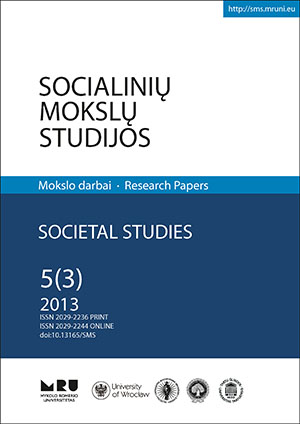Socialinio teisingumo suvokimas: piliečių ir vartotojų vertybiniai skirtumai
Social Justice Perception: Citizens and Consumers Approach
Author(s): Vitalija Rudzkienė, Miglė Eleonora ČERNIKOVAITĖSubject(s): Social Sciences
Published by: Mykolas Romeris University
Keywords: perceived social justice; social values; social groups; citizens; customers; value diversity
Summary/Abstract: The changes in modern welfare states engendered by globalization, social needs and environmental issues evoke the question of the social bases of support of the modern welfare state system. Although socially just sustainable society is the main value and the general purpose of social development, the concept of a model for the ideal society accepted by some groups of different ideologies and different levels of development significantly differs. The research on social values in the scientific literature indicates the two social groups, citizens and consumers, having the sharpest contrasts in social value systems. This difference between these groups derives from two distinct ideologies and distinct value systems. By searching for the answer how the differences of these groups impact the perception of social justice values, which is crucial for a long term socio-economic development, the authors developed a theoretical framework, which outlines the structural relationship between the social attributes, principles of justice and individual preferences. Using data from a recent representative populationbased survey on attitudes about social justice, conducted in Lithuania in 2013 (N=1050), the authors of the article tested a number of assumptions and theoretical hypothesis. The findings revealed three different sets of respondents with distinct value preferences and collectivistic attitudes. The authors also found that these groups have significant differences not only in evaluating the factors that determine the income of the people, but also in the trust in government, participation in decision making, etc. The results allowed to distinguish characteristic features and social justice attitudes of the groups and to create the attribute sets. Prepared according to the scientific project financed by LSC SIN-12005 “Guidelines for Forming Social Justice Perception of Citizens and Customers”.
Journal: Socialinių mokslų studijos
- Issue Year: 5/2013
- Issue No: 3
- Page Range: 751-767
- Page Count: 17
- Language: Lithuanian

